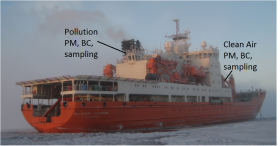Instrumentation for aerosol monitoring and characterization has been developed by a research team of SINP MSU leading by Dr. O. Popovicheva. In October 2015 new aerosol technology was successfully implemented onboard the research ship “Akademik Trechnikov” of the Arctic and Antarctic Research Institute (AARI) during the marine arctic Expedition Sever -2015.
Climate of arctic regions is strongly sensitive to anthropogenic influence. Black carbon in emissions of fossil fuel combustion impacts significantly on the arctic climate, absorbing the solar light, depositing on snow, and accelerating the ice melting. There is a big gap in knowledge about short-living climate forcers, especially in the Russian Arctic.
The research team of SINP MSU leading by Dr. O. Popovicheva, together with Chair of Physical Chemistry of Chemical Department MSU has developed the instrumentation for monitoring of concentration and analytic tools for characterization of aerosols in the atmosphere. New portable 3 - wavelength aethalometer was produced in cooperation with Central Aerological Observatory, Roshydromet for BC measurements at polar climate conditions. Aethalometer is calibrated on GAW station in cooperation research with the National Center for Scientific Research “Demokritos”, Athens.
Aerosol instrumentation was installed onboard the research ship “Akademik Trechnikov” during the marine expedition of the Arctic and Antarctic Research Institute from 6 to 26 October 2015 on the route from a port Arkhangelsk to archipelago Severnaya Zemlya. On-line measurements of aerosol and BC concentrations as well as aerosol sampling were performed at two sites for assessments of clean air and ship exhaust aerosols. Physico-chemical properties of marine arctic and ship-polluted aerosols will be analyzed by microscopy, spectroscopy and analytic chemistry tools.
Aethalometer and sampling system has been installed on the high-latitude Russian station “Ice base Cape Baranova”, archipelago Severnaya Zemlya for long-term monitoring of arctic aerosol characteristics. Data obtained will be transferred to the international polar monitoring network, to global models, as well as used for comparative assessments of anthropogenic pollution level on Russian arctic stations.

